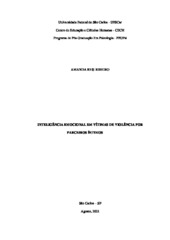Inteligência emocional em vítimas de violência por parceiros íntimos
Resumo
With the awareness and consequent increase in complaints, it is known that violence by intimate partners (IPV) is still a reality for many people, especially women, the main victims of this phenomenon. Many studies report the harmful effects caused by violence. In addition to possible physical damage, violence directly affects the way these victims act in the abusive context, for example, dealing with their emotions. The perception, use, understanding and regulation of emotions are aspects studied by the theory of emotional intelligence. Therefore, one can question the way emotional intelligence is presented in women that live in a violent context. Considering the importance and lack of studies on this topic in Brazil, the aim of this study was to investigate aspects of emotional intelligence in women who report having been victimized by any type of violence by an intimate partner, as well as in women who report having practiced some form of violence against their intimate partners. For this, in a sample of 100 women, with a mean age of 28.19 years (SD = 10.3), IPV behaviors (practiced and suffered) were verified, then were analyzed with the results of the emotional intelligence profile obtained. by different evaluation methods (performance and self-report). The instruments used were the Conflict Tactics Scale (CTS2), to verify violence in intimate partner relationships, as well as emotional intelligence assessment instruments, the Emotional Intelligence Assessment Battery - BIE (performance measurement) and the Emotional Skills Inventory - ICE 3.0 (measurement by self-report). The results suggest that there was a pattern of greater frequency and greater severity of violent attitudes practiced against women, although more participants reported having practiced IPV than suffered. As for the emotional intelligence profile, the data obtained by the BIE and by the ICE demonstrate a conformity of the sample means in relation to other studies that applied these tests in other samples. In addition, the study found that the facets related to Emotional Regulation were similarly conceptualized in self-report and performance tests, contradicting studies in the field that demonstrate different results between the performance EI test format and the self-report format. The data found also indicate an important negative association of EI skills, specifically those related to Emotional Understanding and Regulation, with the practice and victimization of intimate partner violence, especially with psychological aggression. These findings are found in both correlation analyzes and tests of mean differences between groups of participants. Contrary to this, the correlation results suggest that Emotional Regulation is also positively associated with violent practices, when the analyzes are performed considering the consensus calculation. However, Emotional Regulation (general, without the consensus calculation, as well as the second factor of the facet) was also associated with greater use of negotiation tactics by participants' partners in tests of mean differences between participants. Except for its limitations, this research intends to contribute, through these findings, to the discussion and understanding of both the emotional intelligence construct and intimate partner violence in Brazil, being a pioneering research in the country.
Collections
Os arquivos de licença a seguir estão associados a este item:

